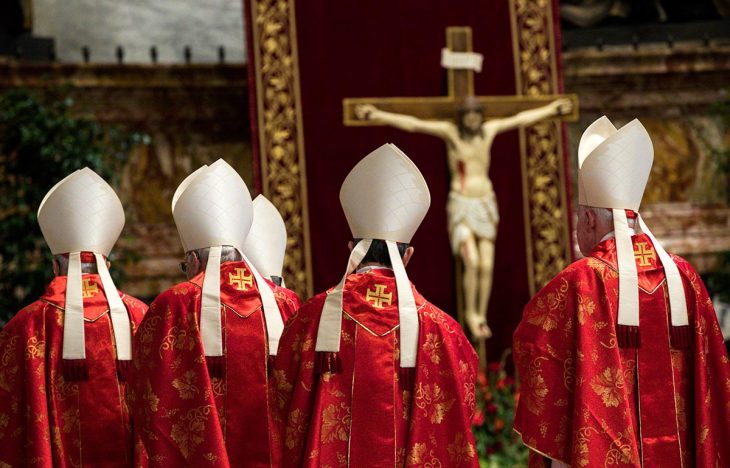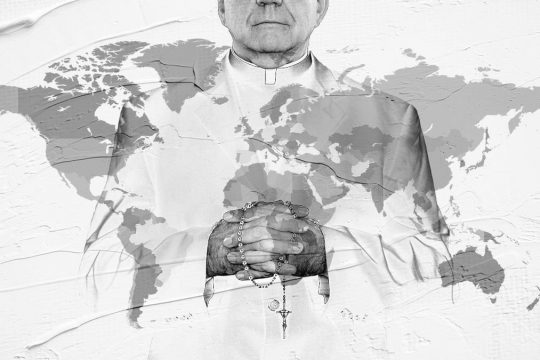In September 2011, the Survivors’ Network of People Abused by Priests (SNAP), an American association of 10,000 victims of priests of various faiths, asked the Prosecutor of the International Criminal Court (ICC) to open an investigation for crimes against humanity against Pope Benedict XVI and three top cardinals.
“These men operate with impunity and without accountability,” it said. “The Vatican officials charged in this case are responsible for rape and other sexual violence and for the physical and psychological torture of victims around the world both through command responsibility and through direct cover up of crimes. They should be brought to trial like any other officials guilty of crimes against humanity.”
The request to the ICC charged that “Vatican officials tolerate and enable the systematic and widespread concealing of rape and child sex crimes throughout the world”. And the website of the Center for Constitutional Rights (CCR) gave examples of principles on which the ICC could open an investigation: “The jurisdiction of the ICC names rape, sexual violence assault, and torture as crimes against humanity. It also provides for individual criminal liability for those with command or superior responsibility over those who directly commit such crimes.”
Were there orders or a concerted policy?
But can these crimes be qualified as crimes against humanity and thus fall within ICC jurisdiction?
"The problem with international crimes is not really who committed them. The problem is whether they were systematic, which implies and has as an accessory, planning. [In the Church], you have to ask yourself if there was a connection, an order, something that said to everyone in the Church, 'if you do this, it's not a problem,'" explains international lawyer Anna Myriam Roccatello, deputy executive director of the International Center for Transitional Justice (ICTJ). In the case of sexual abuse by clergy, "you'll never get that, so the case is weak," she adds.
According to the Rome Statute, the ICC’s founding treaty, a crime against humanity is a "widespread or systematic attack directed against any civilian population, with knowledge of the attack”. And the ICC adds that the attack must take place "pursuant to or in furtherance of a State or organizational policy to commit such attack”. It would therefore have to be proven that the Church covered up the facts to the point of making them the focus of a policy.
Deliberate abstention from action
Before all international tribunals, even if they retain slightly different definitions of crimes against humanity, the planning and implementation of an attack against an entire civilian population requires elaborate organization, notes Parisian lawyer Clara Gérard-Rodriguez, who is also on the list of assistant to counsel before the ICC. The existence of a preconceived policy or plan of the church institution, whether or not formally stated, would have to be demonstrated, and it would have to be shown that the criminal acts were inspired or ordered by it. The individual act must be the link in a chain and be attached to a system or a plan. "In exceptional circumstances, such a policy may take the form of a deliberate abstention from action, whereby the State or organization consciously intends to encourage such an attack," says Gérard-Rodriguez, but "the existence of such a policy cannot be inferred solely from the fact that the State or organization refrains from action.”
The legal obstacle seems to be a big one. There are others, such as the fact that the jurisdiction of the ICC does not cover acts committed before July 2002, that this court can only intervene if a State is unwilling or unable to do so, and that neither the Vatican - with its special status - nor the United States, for example, are members of the ICC.
Statute of limitations and superior responsibility
Qualifying these crimes as crimes against humanity has two major attractions, experts note. The first is that the crime no longer becomes subject to a statute of limitations. In France, for example, a sexual crime against a minor can no longer be brought to a criminalcourt 20 years after the victim has reached the age of majority. However, if the facts are qualified as a crime against humanity, this limit no longer applies. Justice could thus go back in time and take up cases that would otherwise escape its grasp.
The second attraction of prosecuting crimes against humanity at the international level is the ability to prosecute individuals according to the principle of command responsibility: a superior can become responsible for the crimes of his subordinates if he knew or had reason to know of their commission and did nothing to punish or prevent them. "In this particular context [of sexual abuse in the Church], it is obvious that the hierarchy knew what was going on and did nothing, when it could have reacted. There would therefore be favourable elements for charging Church leaders," explains Marina Eudes, a lecturer in public law at the University of Paris-Nanterre.
This principle of command responsibility has flourished in international tribunals where it has made it possible to indict heads of State or government as well as military leaders. But at the national level, this principle seems to be absent. "It was created especially in international crimes to target the masterminds of the crime, those who organized it, rather than the direct perpetrators. I'm not sure that this approach can be copied and pasted into domestic criminal law," warns Eudes. In France, for example, notes Gérard-Rodriguez, only such high-ranking officials could be prosecuted "if they could be considered as accomplices to the crimes committed, that is, if they had provoked the crime, given instructions to commit it or facilitated its preparation or commission, by aiding or assisting" or "if they had committed another crime, for example not reporting a crime, or even - why not - endangering others.”
"Not all sexual violence is a crime against humanity"
A question of immunity from prosecution may also arise. "Under immunity law, a foreign State (and some of its officials and diplomats) cannot be prosecuted in the criminal courts of another State. It would be necessary to verify if this principle also applies to the Vatican, but the fact that the Vatican had to waive the immunity of its ambassador Bishop Ventura [Apostolic Nuncio to France from 2009 to 2019, sued in connection with a sexual assault case] in order for him to be prosecuted in France suggests that it does," Gérard-Rodriguez stresses.
At both the international and national levels, therefore, legal obstacles appear numerous and make it particularly hard for a criminal court to hold against the Church and its top officials that the sexual abuse inflicted on thousands of minors throughout the world by members of the clergy, often covered up by the hierarchy, is a crime against humanity. All the experts interviewed seem to conclude that "not all sexual violence is war crimes or crimes against humanity," according to Jean-Pierre Massias, professor of public law at the University of Pau and president of the Francophone Institute for Justice and Democracy.








